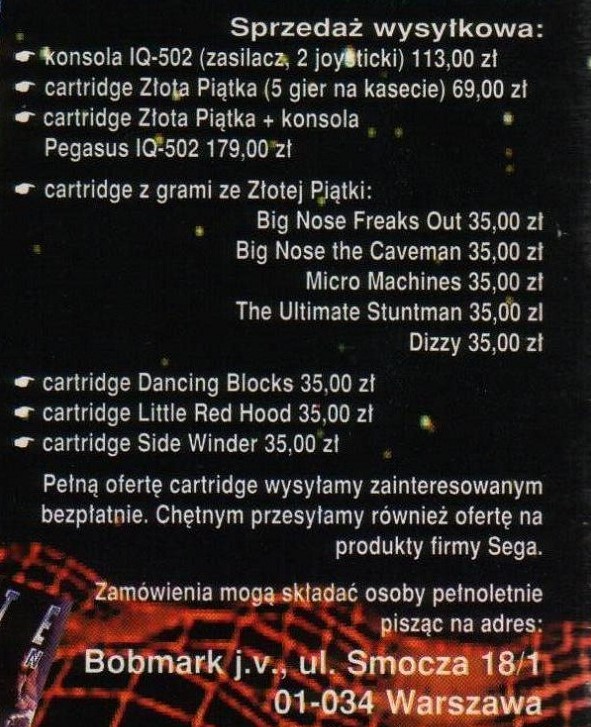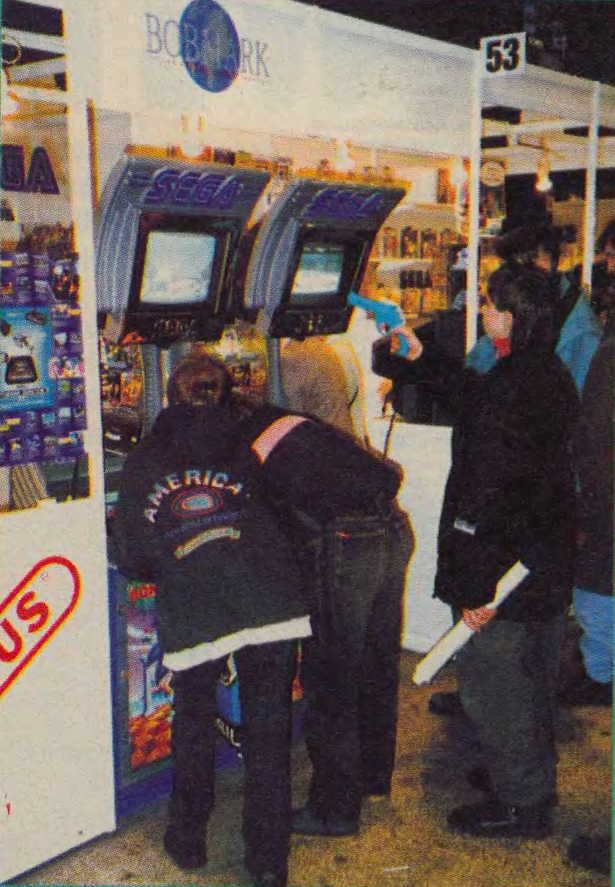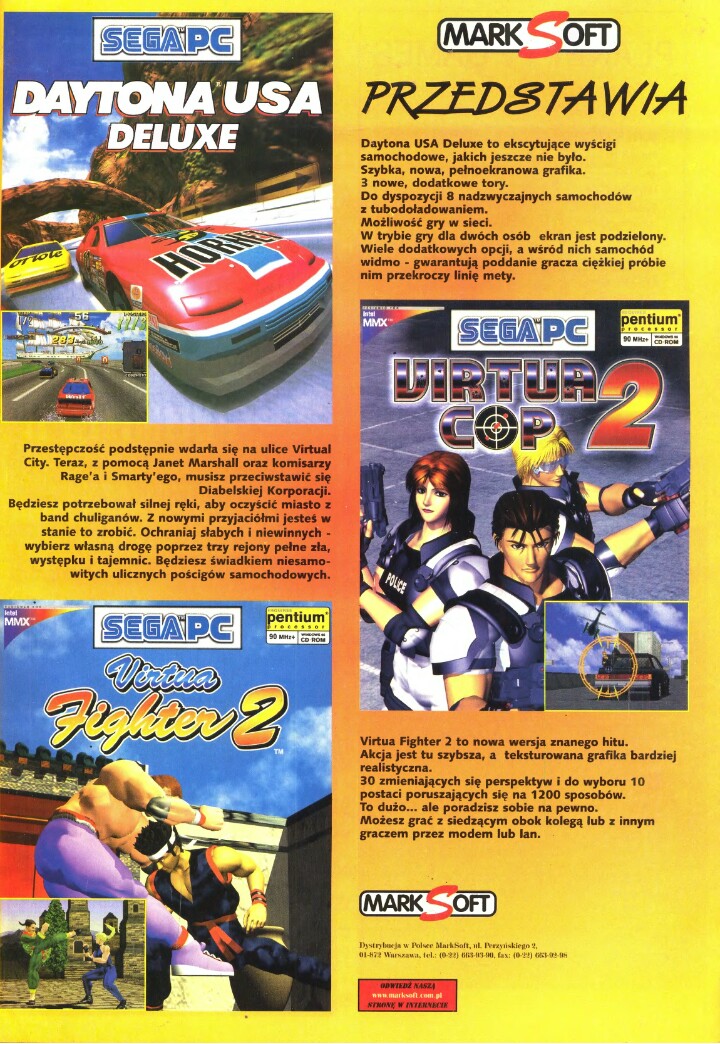Difference between revisions of "History of Sega in Poland"
From Sega Retro
Lukdriver14 (talk | contribs) |
Lukdriver14 (talk | contribs) |
||
| Line 35: | Line 35: | ||
== Lanser and Marksoft == | == Lanser and Marksoft == | ||
| − | In end of 1997 [[Lanser]] became Sega distributor and continued sell of Sega Saturn.{{fileref|SecretService_PL_51.pdf|page=74}}Since 1998, the sale of Sega PC games has been taken by [[Marksoft]].The first [[Sega Dreamcast]] consoles appeared thanks to importers in November 1999 who imported consoles from Western Europe at a price of 1450 PLN.Consoles were called '''DeCek''' or '''Makaron''' (eng.Pasta) because of its logo.<ref>http://lavocado.pl/2018/01/17/sega-dreamcast-nie-zyje/</ref> On October 18, 2000, Lanser signed a contract with Sega to distribute Dreamcast. Premiere announced on December 1,2000. 45 games were promised on the day of the release together with the Polish instruction. In November, the number of games was increased to 49 and 20 new titles have been promised by the end of the year.<ref>https://gry.interia.pl/news-dreamcast-w-polsce-wywiad,nId,727953</ref> The consoles had a special voucher on DVD and it was possible to buy it at a lower price.The console was sold with price of 999 PLN. In March 2001 a price reduction was announced and the console cost PLN 699.<ref>https://gry.interia.pl/news-oficjalny-dystrybutor-dreamcast,nId,727666</ref>After the price reduction, over 10,000 consoles were sold.In September 2001, there was another price reduction, which also increased sales.Despite the collapse of the console in the world,Dreamcast was more supported in Poland than previous Sega consoles. | + | In end of 1997 [[Lanser]] became Sega distributor and continued sell of Sega Saturn.{{fileref|SecretService_PL_51.pdf|page=74}}Since 1998, the sale of Sega PC games has been taken by [[Marksoft]].The first [[Sega Dreamcast]] consoles appeared thanks to importers in November 1999 who imported consoles from Western Europe at a price of 1450 PLN.Consoles were called '''DeCek''' or '''Makaron''' (eng.Pasta) because of its logo.<ref>http://lavocado.pl/2018/01/17/sega-dreamcast-nie-zyje/</ref> On October 18, 2000, Lanser signed a contract with Sega to distribute Dreamcast. Premiere announced on December 1,2000. 45 games were promised on the day of the release together with the Polish instruction (the back of the box was translated into Polish using self-made stickers). In November, the number of games was increased to 49 and 20 new titles have been promised by the end of the year.<ref>https://gry.interia.pl/news-dreamcast-w-polsce-wywiad,nId,727953</ref> The consoles had a special voucher on DVD and it was possible to buy it at a lower price.The console was sold with price of 999 PLN. In March 2001 a price reduction was announced and the console cost PLN 699.<ref>https://gry.interia.pl/news-oficjalny-dystrybutor-dreamcast,nId,727666</ref>After the price reduction, over 10,000 consoles were sold.In September 2001, there was another price reduction, which also increased sales.Despite the collapse of the console in the world,Dreamcast was more supported in Poland than previous Sega consoles. |
The Sega games released by Empire were distributed by [[Techland]]. | The Sega games released by Empire were distributed by [[Techland]]. | ||
Revision as of 06:15, 29 January 2020

|
| History of Sega in Poland |
|---|
| Official Sega distributor(s): Bobmark International (1994-1997), Lanser (1997-2003), CD Projekt (2003-2014), Cenega (2014-present) |
The fall of communist Poland in the September of 1989 led to the peaceful transition to the Third Polish Republic in the years that followed. No longer under strict political regimes and the wider sphere of influence from the Soviet Union, Poland was able to open its markets in the early 1990s, enabling the country to import luxary items (such as video game consoles) from elsewhere.
Contents
Bobmark
Like many of its contemporaries, Sega did not immediately create distribution channels across the Eastern bloc, so in order to supply video games to the country, local companies were forced to innovate. Bobmark International was among the first companies to enter the Polish market, and in 1992 began distributing Pegasus consoles in the region - a clone of the Nintendo Famicom which also found success across the former Yugoslavian republics around this time.
The Pegasus line would become the dominant console across Poland, however 1994 saw a change in the law preventing Bobmark from selling another unlicensed system. In response, the company acquired an official distribution license from Sega, and in 1994 began marketing Sega products in the country. Bobmark created a new company, trading as AGES ("Sega" reversed) specifically to distribute these systems.
Alongside the model 1 and 2 Sega Mega Drive, Ages would attempt to market the model 2 Sega Mega-CD, model 2 Sega Master System model 2 , Sega Game Gear and Sega 32X in the region.The console warranty service was handled by Eltors Electronic, which had previously provided the same service for Pegasus consoles.
The Polish public were not receptive - no Sega console sold as well as the company had hoped, unlike its Pegasus systems which were far more popular.This was the result of poor advertising and further support of the Pegasus console. [1]
In response (and possibly with the blessing of Sega), Bobmark began selling the unlicensed Taiwanese-built KW-501 Mega Drive clone as the Power Pegasus. Released in preparation for Christmas 1995 [2] and hoping to trade off a more successful brand, it too failed to catch on.Once again, Sega related product lost through the lack of proper advertising.
On March 1, 1996 Bobmark completely took over the distribution duties from Ages and released the Sega Saturn on event called Play Box 96.[3]Despite its large advertising campaign like Wygraj Samochód z Sega Saturn or promoting the system in Escape show , the system fell short of expectations. In end of 1997 the company cancelled its distribution agreement[4].
In 1996, TCI's technology group got the rights to distribute the Sega Channel in Poland, but it is not known that the service was launched there.
also published in:
- Secret Service (PL) #38: "Wrzesień 1996" (1996-09-01)[5]
Lanser and Marksoft
In end of 1997 Lanser became Sega distributor and continued sell of Sega Saturn.[6]Since 1998, the sale of Sega PC games has been taken by Marksoft.The first Sega Dreamcast consoles appeared thanks to importers in November 1999 who imported consoles from Western Europe at a price of 1450 PLN.Consoles were called DeCek or Makaron (eng.Pasta) because of its logo.[7] On October 18, 2000, Lanser signed a contract with Sega to distribute Dreamcast. Premiere announced on December 1,2000. 45 games were promised on the day of the release together with the Polish instruction (the back of the box was translated into Polish using self-made stickers). In November, the number of games was increased to 49 and 20 new titles have been promised by the end of the year.[8] The consoles had a special voucher on DVD and it was possible to buy it at a lower price.The console was sold with price of 999 PLN. In March 2001 a price reduction was announced and the console cost PLN 699.[9]After the price reduction, over 10,000 consoles were sold.In September 2001, there was another price reduction, which also increased sales.Despite the collapse of the console in the world,Dreamcast was more supported in Poland than previous Sega consoles.
The Sega games released by Empire were distributed by Techland.
CD Projekt and Cenega
In 2003, CDP became the exclusive distributor of Sega products.[11] The cooperation lasted until 2014 in which the functions of the distributor were taken over by Cenega. This was due to problems in the CDP company.[12]Cenega is still the official representative of Sega in Poland and throughout the Visegrad Group
Before Sega
Even before the official distribution, Sega appeared in Poland. Many people went abroad and there often bought child consoles mostly from Sega or Nintendo. These consoles aroused big interest in many people who only saw the widespread Pegasus consoles. They were also a problem because the owners could not get games to the console.
At the beginning of 1994, the first Sega Mega Drive clones appeared.Hegatar Computing started selling the Super Drive console[13],however, was not popular and was quickly forgotten.There were other clones but they were not very popular. Their price was about 300 PLN.[14]
Some stores started to sell bootleg games which cost less than 50 PLN.
Magic Play
Nowadays, Sega arcades are distributed by Magic Play.[15]
References
- ↑ File:TopSecret PL 41.pdf, page 59
- ↑ File:TopSecret 38 PL Play Box 95.jpg
- ↑ https://retrocdn.net/File:SecretService_34_PL_Bobmark.png
- ↑ http://www.strefapsx.pl/ceny-konsol-w-polsce-w-latach-1996-2006/
- ↑ Secret Service, "Wrzesień 1996" (PL; 1996-09-01), page 75
- ↑ File:SecretService_PL_51.pdf, page 74
- ↑ http://lavocado.pl/2018/01/17/sega-dreamcast-nie-zyje/
- ↑ https://gry.interia.pl/news-dreamcast-w-polsce-wywiad,nId,727953
- ↑ https://gry.interia.pl/news-oficjalny-dystrybutor-dreamcast,nId,727666
- ↑ Neo Plus, "Listopad 2000" (PL; 2000-xx-xx), page 18
- ↑ https://www.gry-online.pl/S013.asp?ID=8606
- ↑ http://www.komputerswiat.pl/gamezilla/newsy/2014/13/cd-projekt-po-cichu-stracil-sege
- ↑ Gry Komputerowe 4/1994 page 12
- ↑ PSX Extreme 247
- ↑ https://magicplay.eu/?en_about-us,3








